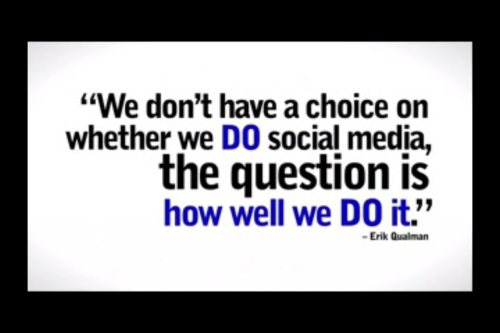 |
| courtesy of dknyprgirl |
Social media is now part of how organizations, companies and
society operate. Organizations big and small, urban and rural, tech savvy and
tech adverse, can no longer ignore or avoid the importance and impact of social
media. As I continue to explore what ICT can mean for rural development, the
role of social media is quickly becoming a central part of that exploration. As
a result, I am increasingly immersed in social media, expanding beyond the
longtime facebook presence and establishing more comprehensive profiles and a more active presence in the other main networks including Google+, LinkedIn, Twitter and
most recently Pinterest.
Not surprisingly my network of colleagues, friends and
family have also been increasing their engagement in social media and I have quickly
found that I many of the same connections online as I have offline.
However, one of the main differences with social networking is that it is designed
to expand your network beyond those people you know face to face, while also
greatly facilitating the exchange of knowledge, ideas and even people.
Now, in addition to my current ‘real-world’ or offline
network, I have in my ‘circles’, am ‘following’, ‘friends with’, ‘connected-to’,
and ‘re-pin’ leaders and practitioners in development, research, technology and
even spirituality. The knowledge that flows through my social network on a daily
basis is very informative and inspiring. The
network of experts and practitioners at my fingers tips to learn from and share
with grows daily and far exceeds what I could’ve achieved a few short years
ago before social media. All of this has affirmed that rural communities and
organizations need to insure that they are also on the social media bandwagon
as the dangers of missing it are now too significant to ignore.
The Social Media
“Push”
One of the key benefits of social media is the ability to
easily and effectively share information, knowledge and ideas with others.
Rural communities are no longer affected by being isolated from
networks, businesses, stakeholders or even prospective residents. Social media
allows rural communities and organizations to promote themselves and to
share their information in a much more effective manner than ever before. As an
example, a rural community that posts an event on their website relies on users
to come to the website to be aware of the event. While websites are still a very important tool, social media creates a dynamic network of interested
participants who are waiting for information to be sent to them and many of whom are
willing and wanting to forward that information to their extended networks. A
study by the market research company AYTM study indicates that 57% of users on
facebook have more than 100 friends and 25% of users on twitter have more than
100 followers; the community event notice can reach thousands of people through
social networking in the time it takes dozens to visit the community
website.
The Social Media
“Pull”
For those communities and organizations that are not
producing lots of content or not ready to share information regularly, social
media provides a window into a cycle of knowledge exchange, idea generation and
discussion that is seemingly endless in terms of the topics available and in
the constant evolution of this content. Social networks are a fantastic source
of knowledge and you can find participants, experts and groups of participants
and experts that provide a wealth of information. Through social media, rural
communities and organizations can easily follow the latest discussions on
relevant topics and be up to date on news, events and announcements related to
them or their economies. Rural businesses can know what their customers want
and what their competition is doing as it happens.
The Social Media “Access”
to Talent
One of the most significant indicators of the importance of
social media, is the rapid evolution of employee recruitment and hiring. According
to Careerenlightnement.com an amazing 91% of companies are now using social
media in some manner for recruiting. Recruiters are using social media,
primarily facebook and LinkedIn, to verify qualifications, to get a better
understanding of applicants’ interests and expertise and to determine if there
are any potential character issues. Many companies are basing decisions on what
they find as 68% of companies having hired or rejected applicants based on
social media. As a result, job hunters are focusing their job searches,
networking efforts and communication activities on social media. If rural
companies and communities are not engaged in social media, they are going to
find that talent is harder and harder to find as potential employees are no
longer searching and applying for jobs in the same manner any more.
Sources
No comments:
Post a Comment
Let me know what you think!